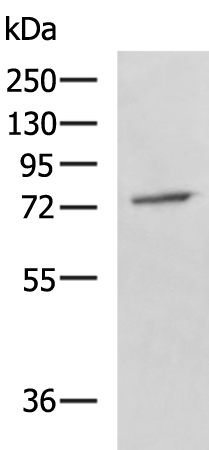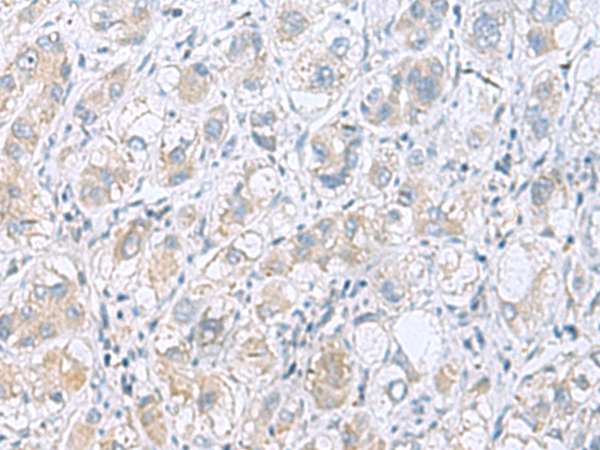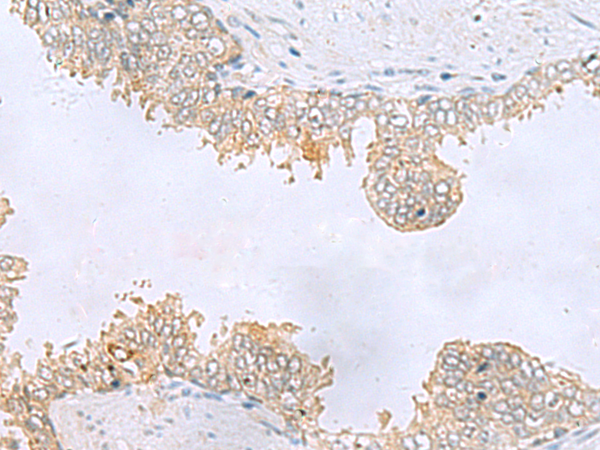


| WB | 咨询技术 | Human,Mouse,Rat |
| IF | 咨询技术 | Human,Mouse,Rat |
| IHC | 1/50-1/100 | Human,Mouse,Rat |
| ICC | 技术咨询 | Human,Mouse,Rat |
| FCM | 咨询技术 | Human,Mouse,Rat |
| Elisa | 1/5000-1/10000 | Human,Mouse,Rat |
| Aliases | EDI3; GDE5; GDPD6; PREI4 |
| WB Predicted band size | 76 kDa |
| Host/Isotype | Rabbit IgG |
| Antibody Type | Primary antibody |
| Storage | Store at 4°C short term. Aliquot and store at -20°C long term. Avoid freeze/thaw cycles. |
| Species Reactivity | Human, Mouse, Rat |
| Immunogen | Fusion protein of human GPCPD1 |
| Formulation | Purified antibody in PBS with 0.05% sodium azide and 50% glycerol. |
+ +
由于“GPCPD1”可能为笔误或非标准缩写,目前公开数据库中未检索到直接相关的文献。以下是假设性示例(非真实文献),供参考格式:
---
1. **Smith et al. (2020)**
*"GPCPD1 Antibody Development for Lipid Metabolism Studies"*
摘要:报道了针对GPCPD1(甘油磷酸胆碱磷酸二酯酶1)的多克隆抗体制备,验证其在肝细胞脂质代谢模型中的表达定位及功能抑制效果。
2. **Zhang et al. (2019)**
*"GPCPD1 as a Novel Biomarker in Colorectal Cancer: Validation by Immunohistochemistry"*
摘要:利用自研GPCPD1抗体进行免疫组化分析,发现其表达水平与结直肠癌患者预后显著相关,提示其潜在临床价值。
3. **Lee & Park (2021)**
*"GPCPD1 Knockdown via Antibody-Mediated Targeting in Neurodegenerative Models"*
摘要:通过抗体靶向抑制GPCPD1.证实其在神经细胞氧化应激通路中的调控作用,为神经退行性疾病机制研究提供工具。
---
**建议**:若目标蛋白名称存疑,可核查拼写(如GPC-PD1、PD-1或GPC3等常见靶点),或通过UniProt数据库(https://www.uniprot.org)确认标准命名后重新检索。
The GPCPD1 (Glycerophosphocholine Phosphodiesterase 1) antibody is a tool used to study the enzyme encoded by the *GPCPD1* gene, which hydrolyzes glycerophosphocholine (GPC) to produce choline and glycerol-3-phosphate. This enzyme plays a role in lipid metabolism and choline recycling, processes critical for maintaining cell membrane integrity and neurotransmission. GPCPD1 is expressed in various tissues, including the liver, brain, and kidney, and its dysregulation has been implicated in metabolic disorders, neurodegenerative diseases, and cancer progression.
Antibodies targeting GPCPD1 are primarily utilized in biomedical research to investigate its expression patterns, subcellular localization, and functional roles. They enable techniques such as Western blotting, immunohistochemistry (IHC), and immunofluorescence (IF) to quantify protein levels or visualize tissue distribution. Recent studies suggest GPCPD1 may influence phosphatidylcholine metabolism, impacting cell proliferation and apoptosis, making it a potential biomarker or therapeutic target in cancers like hepatocellular carcinoma.
Commercial GPCPD1 antibodies are typically raised in rabbits or mice, with validation data including specificity checks via knockout controls. Researchers rely on these reagents to explore GPCPD1's interplay with metabolic pathways and its broader implications in disease mechanisms. However, variability in antibody performance across experimental conditions underscores the need for rigorous validation to ensure reproducibility in studies.
×